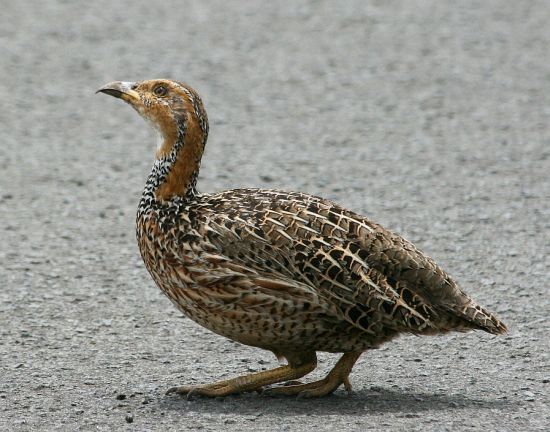(genus link; corrected location of photo) |
|||
| Line 1: | Line 1: | ||
| − | + | ;[[:Category:Francolinus|Francolinus]] levaillantii | |
| − | ;[[:Category: | + | [[Image:2007_10_23_10_59_Red-winged_Francolin.jpg|thumb|550px|right|Photo by Alan Manson<br>Royal Natal National Park, KwaZulu-Natal, South Africa.]] |
| − | |||
| − | [[Image:2007_10_23_10_59_Red-winged_Francolin.jpg|thumb|550px|right|Photo by Alan Manson<br | ||
| − | |||
| − | |||
==Identification== | ==Identification== | ||
Length 33-38 cm, mass 400-460 g; males are larger than females, but otherwise the sexes are similar. Upper parts are mostly brown with black blotches, buffy barring and whitish feather shafts. The throat is white with tawny edges, and a broad black-and-white collar which extends up the sides of the neck to below the eyes. Another black-and-white stripe extends from the mantle, up the back of the neck, to the sides of the crown. The remainder of the back of the neck and face are rufous. The belly is buff, streaked chestnut and the breast is almost solid chestnut. The large bill is decurved and black with a yellow base. The eyes are brown and the legs and feet are dull yellow. In flight, the wings are mostly rufous, more so than for the [[Grey-winged Francolin]], [[Shelley's Francolin]], and [[Orange River Francolin]]. The [[Grey-winged Francolin]] has a grey throat without tawny edges, is generally paler, and is less rufous below. [[Shelley's Francolin]] has a white throat bordered with black, and the lower breast and belly have heavy black markings. The [[Orange River Francolin]] lacks the broad black-and-white collar and the tawny edges to the white throat. | Length 33-38 cm, mass 400-460 g; males are larger than females, but otherwise the sexes are similar. Upper parts are mostly brown with black blotches, buffy barring and whitish feather shafts. The throat is white with tawny edges, and a broad black-and-white collar which extends up the sides of the neck to below the eyes. Another black-and-white stripe extends from the mantle, up the back of the neck, to the sides of the crown. The remainder of the back of the neck and face are rufous. The belly is buff, streaked chestnut and the breast is almost solid chestnut. The large bill is decurved and black with a yellow base. The eyes are brown and the legs and feet are dull yellow. In flight, the wings are mostly rufous, more so than for the [[Grey-winged Francolin]], [[Shelley's Francolin]], and [[Orange River Francolin]]. The [[Grey-winged Francolin]] has a grey throat without tawny edges, is generally paler, and is less rufous below. [[Shelley's Francolin]] has a white throat bordered with black, and the lower breast and belly have heavy black markings. The [[Orange River Francolin]] lacks the broad black-and-white collar and the tawny edges to the white throat. | ||
==Distribution== | ==Distribution== | ||
The distribution is patchy in central, eastern and southern [[Africa]]. | The distribution is patchy in central, eastern and southern [[Africa]]. | ||
| − | |||
==Taxonomy== | ==Taxonomy== | ||
| − | There are two subspecies (Hockey | + | There are two subspecies (Hockey et al., 2005): ''F. l. levaillantii'' is the southern race from southern and eastern South Africa, western Swaziland, Malawi, and Zambia (described above). |
| + | ====''Scleroptila'' vs. ''Francolinus''==== | ||
| + | Sibley & Monroe (1996) placed this species in the genus ''Scleroptila'', but this genus has not been recognized by Clements (2007) or Howard & Moore (2003), and the Opus follows in this consensus. | ||
==Habitat== | ==Habitat== | ||
Grasslands and fynbos, preferring rank vegetation. | Grasslands and fynbos, preferring rank vegetation. | ||
Revision as of 15:10, 9 July 2008
- Francolinus levaillantii
Identification
Length 33-38 cm, mass 400-460 g; males are larger than females, but otherwise the sexes are similar. Upper parts are mostly brown with black blotches, buffy barring and whitish feather shafts. The throat is white with tawny edges, and a broad black-and-white collar which extends up the sides of the neck to below the eyes. Another black-and-white stripe extends from the mantle, up the back of the neck, to the sides of the crown. The remainder of the back of the neck and face are rufous. The belly is buff, streaked chestnut and the breast is almost solid chestnut. The large bill is decurved and black with a yellow base. The eyes are brown and the legs and feet are dull yellow. In flight, the wings are mostly rufous, more so than for the Grey-winged Francolin, Shelley's Francolin, and Orange River Francolin. The Grey-winged Francolin has a grey throat without tawny edges, is generally paler, and is less rufous below. Shelley's Francolin has a white throat bordered with black, and the lower breast and belly have heavy black markings. The Orange River Francolin lacks the broad black-and-white collar and the tawny edges to the white throat.
Distribution
The distribution is patchy in central, eastern and southern Africa.
Taxonomy
There are two subspecies (Hockey et al., 2005): F. l. levaillantii is the southern race from southern and eastern South Africa, western Swaziland, Malawi, and Zambia (described above).
Scleroptila vs. Francolinus
Sibley & Monroe (1996) placed this species in the genus Scleroptila, but this genus has not been recognized by Clements (2007) or Howard & Moore (2003), and the Opus follows in this consensus.
Habitat
Grasslands and fynbos, preferring rank vegetation.
Behaviour
Localised and uncommon. In pairs or small coveys of up to ten birds. Flushes reluctantly, and will seldom flush more than once, preferring to remain immobile in thick cover. Food is mainly bulbs and insects.
References
Hockey PAR, Dean WRJ & Ryan PG (eds) 2005. Robert's Birds of Southern Africa, 7th edition. Cape Town: John Voelcker Bird Book Fund. ISBN 0620340533




